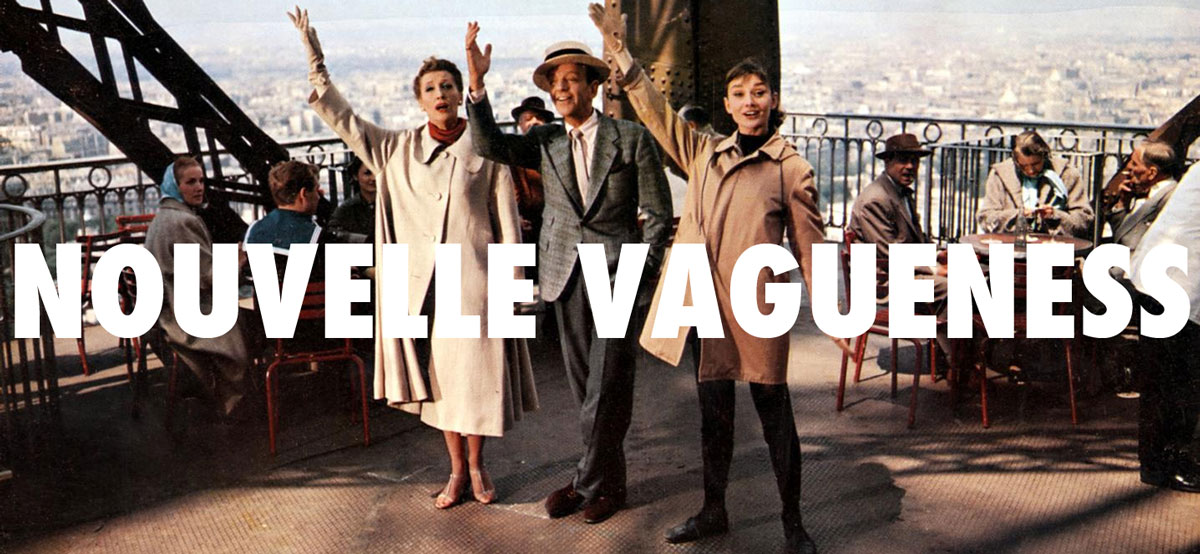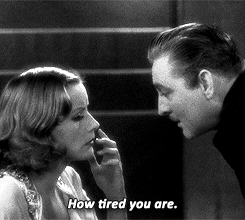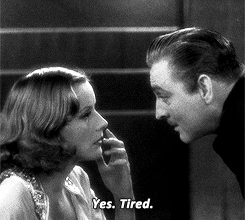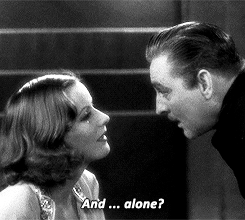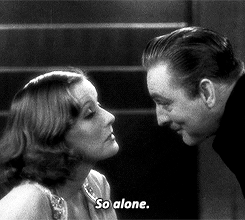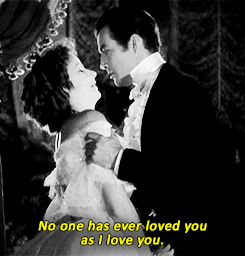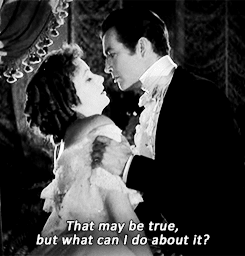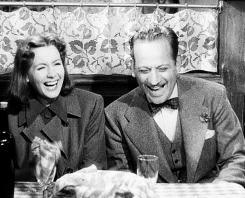 |
| Lyrics borrowed from Beyoncé. |
 |
| dis be the hat from "Mata Hari"(1931) |
The whole concept of naturalistic acting has been skewed by what has ever since been taken as the definitive example of naturalism set by Dustin Hoffman and co in the 1970s. I think Bette Davis summed up how I feel about Garbo's acting pretty well in her book, "The Lonely Life":
"Her instinct, her mastery over the machine, was pure witchcraft. I cannot analyze this woman's acting. I only know that no one else so effectively worked in front of a camera."So... "In Defence of Garbo's Naturalism."
Greta Garbo has always been held up in movie-goers imaginations (including my own) as some kind of oracle sent from Sweden to educate the masses on how to be mysterious and mythical and "Garbo." This fog of mystique shrouded her and in many ways suffocated her until 1942 when she left Hollywood for an elusive life collecting art and generally being very "herself" in New York. This kind of emotional liberation was crucial to Garbo. She longed to be herself, to explore all the possible alleyways of her purpose in the world. She came from Sweden to Hollywood not expecting anything and she got everything and more.
When Ingrid Bergman was brought over from Sweden by David O. Selznick in the late 1930s, she had learnt enough about movies and movies had learnt enough about themselves for her to feel confident enough to stand her ground when executives and directors asked her to "cap her teeth," "lose some weight," or "change her name." Garbo wasn't as lucky. Garbo had lived a very sheltered life in Sweden having to fend for herself in a working-class family. This meant that she never even went to Swedish "high school," a fact which plagued her with insecurities throughout her life. So of course when she got to Hollywood she was hella out of place and didn't know what to do with herself.
The first photographs taken by Arnold Genthe and Russell Ball in 1925 when Greta first arrived in New York were described by Giusi Ferré in the book, "Greta Garbo: The Mystery of Style":
[Left: Arnold Genthe, Right: Russell Ball]
In the sensuality of the pose and the gaze, Ball aims to emphasise the woman's power to seduce; on the other hand, in Genthe's photo, the portrait of the actress is intense and dramatic. Greta Garbo is not presented as a hollywood diva, but rather as the great actress, just like Eleanora Duse and Sarah Bernhardt.So even in these early portraits we can see this contrasting image being created for Garbo. On one hand she's being "sold" as this object of allure and desire, and on the other she's being represented as what she really wanted to be and deserved to be - a revered and idolised actress.
This whole "vamp" image carried on through all of the silent films she made, peaking with the silent, "Flesh And The Devil," in which Greta Garbo's aristocratic character is the human embodiment of physical lust, and she ends up falling through the ice to her death (silents are cray). Fortunately she managed to earn more complex roles with the dawn of talkies.
Greta Garbo and John Barrymore in "Grand Hotel", 1932 [source]
I've always felt that this whole image and legend was what made her feel too smothered and led to her famously saying "I want to be left alone" (which many misquote as, "I want to be alone," a quote from one of her most famous films, "Grand Hotel.") I'm going to take a look at two of my favourite Greta movies from her talkies period to examine the whole "unnatural" mistake in many modern interpretations of Garbo's work: "Camille" (1936), and "Ninotchka" (1939).
CAMILLE (1936) - DIRECTED BY GEORGE CUKOR
[source]
Greta Garbo was always going to be perfect for the colourfully tragic role of Camille, the Parisian courtesan dying of tuberculosis. This here is a perfect example of how it's so easy to box Garbo. Little did the studios know they would be setting her up for a fall fifty years later in the eyes of modern audiences who saw her acting as "too much." Of course there is always a difficulty with audiences adjusting to antiquated styles etc. but no matter how you view Garbo's mid 1930s performances in films like "Mata Hari", "Camille", and "Anna Karenina," it's almost impossible not to find them engaging and exciting.
Take the completely devastating scene between Lionel Barrymore and Greta Garbo in Robert Taylor's character's cottage. Barrymore has come to tell her to leave his son (Robert Taylor) alone because she's a courtesan and will only bring him trouble. He strikes a nerve in Camille and she collapses into tears and cries, knowing that Barrymore is right, "I knew I was too happy."
Now, it's easy to say that this entire scene is very pre-calculated and "over the top". However, I think that it's in scenes like this where we see why Garbo had such a lasting effect on film history. She lets you totally into her heart to experience everything she's feeling. This may not be classified as naturalism in the newfangled Strasburgian way, but it's extraordinarily raw and real. There's no pretence in Garbo. She's showing us exactly how her character feels but is also taking it a step further so that we feel as though she's showing us how she feels. It's not rocket science. She very simply is totally open. That's why audiences find it so hard to take their eyes off of her.
NINOTCHKA (1939) - DIRECTED BY ERNST LUBITSCH
Take the completely devastating scene between Lionel Barrymore and Greta Garbo in Robert Taylor's character's cottage. Barrymore has come to tell her to leave his son (Robert Taylor) alone because she's a courtesan and will only bring him trouble. He strikes a nerve in Camille and she collapses into tears and cries, knowing that Barrymore is right, "I knew I was too happy."
Now, it's easy to say that this entire scene is very pre-calculated and "over the top". However, I think that it's in scenes like this where we see why Garbo had such a lasting effect on film history. She lets you totally into her heart to experience everything she's feeling. This may not be classified as naturalism in the newfangled Strasburgian way, but it's extraordinarily raw and real. There's no pretence in Garbo. She's showing us exactly how her character feels but is also taking it a step further so that we feel as though she's showing us how she feels. It's not rocket science. She very simply is totally open. That's why audiences find it so hard to take their eyes off of her.
NINOTCHKA (1939) - DIRECTED BY ERNST LUBITSCH
[source]
"GARBO TALKS" the posters read for Garbo's first talkie "Anna Christie." "GARBO LAUGHS" read the posters of Garbo's first comedy, "Ninotchka". Directed by Ernst Lubitsch and co-written by Billy Wilder, this film could never have been anything other than a total success. Audiences would have not only been surprised by how blatantly the film pokes fun at the Soviet Union, but also by Garbo's magical touch with deadpan comedy. Who would have guessed! The slinky spy and tortured heroine of Russian epic literature adaptations can make us laugh! What a discovery!!!
It's not just the way that Garbo handles the flat sarcastic lines and put-downs to her fellow "Comrades" (one of whom is one of my favourite character actors of the 1930s, Felix Bresshart - he looks like this), but also the confidence with which she glides through the movie. Her character journey is totally seamless. She's one of the few so called "serious" actresses of the 1930s who made non-slapstick comedy look easy. The only other example I can think of is Norma Shearer in "Private Lives" (1931). Now, I don't know if romantic comedy can ever truly be thought of as naturalism because it's looking at the world "through rose-coloured glasses" - but Greta Garbo certainly shows her ability to mould herself into any character she so chose to. From French Courtesan to Russian Communist Special Envoy, she can make any character seem realistic. Sadly, her next comedy "Two-Faced Woman" was not such a success, and she quit the movie industry for good.
 |
| Still a babe in old age. |
This brings me to my final point on this whole matter. Greta Garbo managed to transform herself into anyone and anything she wanted without ever compromising a bit of her self, which she always let shine through. A glow of the Garbo-ness from around the edges if you will. Isn't that really what naturalism and "good acting" is all about? Making yourself a chameleon but letting the spontaneous and true bit of you through for realism? If it is then Greta Garbo has it in spades. On top of all of her other brands of flawlessness.
